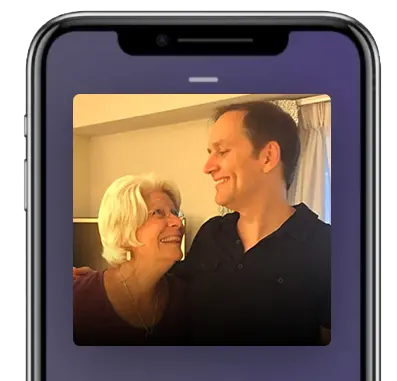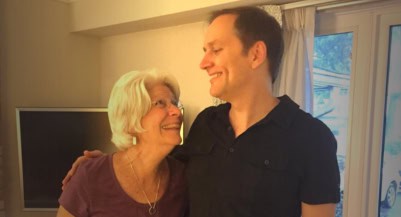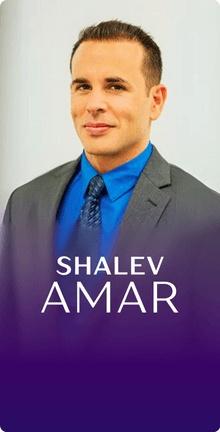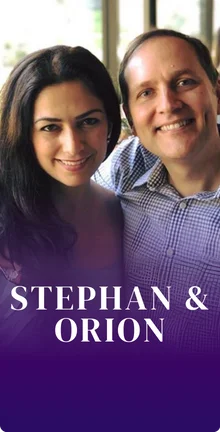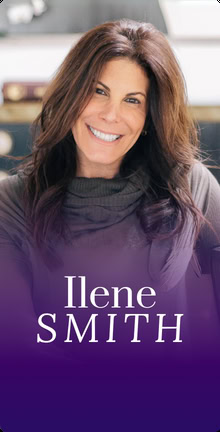In this Episode
- [01:48]Stephan asks Marge Cater about her motivation to become a foster mother. Marge explains how her teaching career led her and her husband to foster care.
- [06:22]Stephan discusses how small actions can be part of a larger divine plan.
- [13:24]Stephan reflects on the life skills he learned living with Marge.
- [18:10]Various ways people can assist foster children and foster families.
- [22:40]Marge and Stephan share special moments and turning points in their relationship.
- [24:03]Final wisdom and encouraging messages from Marge and Stephan.
Marge, hello. Maybe you can start by sharing your motivation to become a foster mother and how this all unfolded for you.
I was a teacher, and at the time, I was teaching fourth grade and had a student that I needed to report to the Child Services Board for parental abuse. I was just so overwhelmed by that because she was a sweet and pleasant girl, and I really enjoyed her in my class. I just felt really horrible doing that. But she came in bruised. It was a bad situation for her; they removed her from the home. I talked with authorities then and said, “I’ll take her. Let me have her, and I’d gladly take her and have her in my house, get her to school daily and smooth over those edges.” Of course, I hadn’t gone through the training, I didn’t have the certification, I didn’t have this, I didn’t have that. So I couldn’t do that for this particular girl and her brother. That really affected me.
Prior to that, my husband and I had been talking about either adopting or foster care. But it has just been taught to that point, nothing obviously serious. This got us over the edge. There are a lot of good kids out there who need good homes, and we can provide that. We went through the training and what it took to be certified and became foster parents.
The system wasn’t working for this child, and we assumed other children. This wasn’t an individual case.
Amazing. So what was the first foster child like? How long did it go? What happened? Why did you end up moving on to another child at some point? How did this all transpire?
The system was broken in Toledo. Our foster child was beautiful, fun, and bubbly. We enjoyed her, but she wasn’t getting the services the system was supposed to provide. She didn’t get clothing, winter boots, or a winter coat. The caseworker didn’t come out to visit like she was supposed to. And finally, the girl didn’t get a Christmas gift from her mother, although the case worker had it. It took until March for the case worker to bring out a Christmas gift. We supplied the clothes and the boots.
My family was very generous at Christmas time, and everybody pitched in and made up for the things the foster care system was not providing. In the end, she was adopted with her sib group by a family out of the county, which had no bearing on us contacting a lawyer and going to court with the Children’s Services Board. This caseworker wasn’t doing her job. Her supervisor wasn’t doing his job to get her to do her job. The system wasn’t working for this child, and we assumed other children. This wasn’t an individual case.
Wow. So you took the foster care system in Toledo, Ohio, to court.
Right. We know that the caseworkers are overbooked. They have too many kids to do too many things they’re responsible for. Yet she wasn’t responsible for anything with this particular child. She was being abused by the system. She wasn’t being taken care of. So, yes, as a teacher, I knew what was expected. I knew what they were supposed to be doing and that something had to be done to stop it. That’s what we did.
Every foster child can give you more than you could ever give them—each experience is a gift, rich with lessons and rewards. Share on XWe took them all away to court and had our day in court. I’m sure it was just a slap on the wrist for the caseworker and her supervisor. But they got a new director at that same time, which turned things around a day in court. I don’t think they turned things around, but they knew they were remiss and needed to make major changes. They got a new top dog. They had a new director.
Well, my understanding of how the upper world’s heavens work is that you do your 2%, which seems to make little difference. The creator handles the other 98%. So if we don’t do that 2%, we just look and say, “Wow, that’s really tragic. What a shame.” If we don’t take action, then the other 98% doesn’t get done. We see in our life review when we pass, like, “Oh, I really should have stepped up.” So good for you. Kudos to you for taking that initiative. I’m sure that it was pretty unusual for a foster parent to take the foster care system to court.
They needed it.
What happened with the next foster child and the next? You’ve had a few foster children over the years, including me. Where did I sit on the list here?
I said, “No matter who we have in our house, you are always, always welcomed.”
Well, our next one was a girl whose mother had been in jail for a period of time. She had previously been in and out of foster care, and the family was unstable. So we had her until her mother was out of jail, and then she was back with her mother. This foster daughter kept in touch with us. She was still in Toledo, and she knew where to call. She was just one of those gregarious kids who crawled into your heart and never left. She went back to her home, and it was a rocky situation. She came back to us several different times afterward as things kind of melted down at home.
So you were a safe haven for her.
We were, and that’s what I told her. We were just taking one child at a time. I said, “No matter who we have in our house, you are always, always welcomed.” And yeah, she came back when we had other foster children.
Why only one foster child at a time?
Well, because they come with a few needs. My husband and I worked, so we had two extra bedrooms. But I figured, one at a time, you came with baggage. Everybody has baggage. For me, to better deal with that baggage or to better help the child, it needed to be one child at a time.
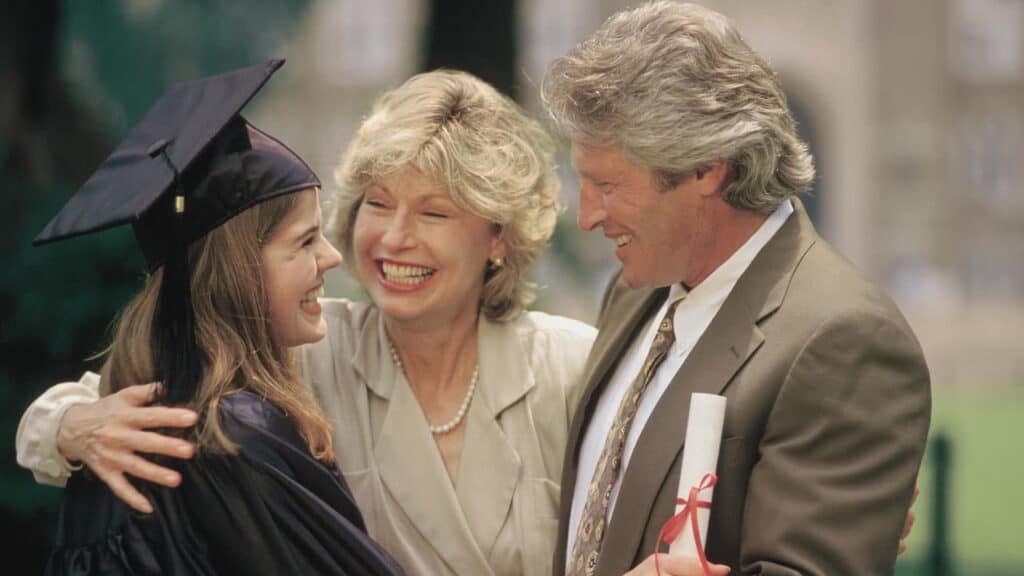
Let’s talk about my baggage.
So let’s see, your grandfather was still and in the process, ultimately, of passing away.
I was living there with my grandfather, who surprised me by calling Children’s Services. I had no idea that that was in the works, and I felt very alienated and unwanted because of it. Of course, in retrospect, everything is divinely orchestrated. This was all meant to be, but at the time, I felt like nobody wanted me, especially my family.
You were in high school. That’s the most volatile time in your life when things are up and down anyway, and being wanted is so terribly important.
I was a good kid, but even as a good kid, I would test your mettle and boundaries.
You were human, a kid, and really resentful. You were at odds with the whole system and process. A number of times, you would bicycle back to your grandfather’s apartment and be told you needed to come back.

I forgot about that. I remember bicycling in the middle of the night to a girlfriend’s house. I had never been tested in terms of how you tested me or the boundaries you set. I remember one time I snuck back in. It was about 6 AM, and I thought, “Gosh, I hope she’s not awake yet.” Then, there was a policeman waiting for me.
Well, the first time, you had gone with another friend, and the friend’s mother called and said, “Are the boys there?” It was like 5 or 6 AM. I said, “Sure. Well, I think Stephan’s home.” I went and checked, and no stuffing. So by regulation, by the systems doing that, if the child doesn’t show up or is missing, you’ve got to report that immediately. Anyway, my hands were tied. Another mother was frantic. The two boys were together, which was maybe good or not. So, I had to call CSB. That policeman got there before you did.
I had no idea that that was the reason. I thought, “Stephan’s going to learn a lesson here about sneaking out.”
I had to do that. In other cases where other foster kids were supposed to go home for a weekend visit with a parent, and if they weren’t brought back at the time that was planned and you had always given them a little extra hour or whatever, then you were supposed to call Children’s Services because they were not following the contract or the plan. It wasn’t just you in that situation, but that was a safeguard for everybody to report a missing child. So, did that stop you from going out at night?
It made me a little more reticent, but it was memorable—let’s put it that way—and I still remember it.
Well, there was another time when you laid a pillow in bed.
Oh, my goodness. I don’t remember that either, but that’s funny.
Foster families come in many forms—some provide urgent care, and others guide children through school and life. Every kind of fostering makes a difference. Share on XWell, so that had happened. There was another time when you left a message on the kitchen counter saying that you had been home but needed to go out early in the morning, stuffing up and awakening early. That was suspicious. And to don’t call the police. It wasn’t the only time you decided that the bedroom wasn’t your place for that night.
Funny. If you think back to those years, you just don’t have the long-term part of your brain developed until age 25. It was super reckless of me to take a bicycle at, let’s say, one in the morning to spend the night with my girlfriend and go across really sketchy parts of town where there was no traffic and just a kid on a bicycle. And then sneaking back in at 5 in the morning, thinking I’m gonna get away with it.
Anyway, this was an important milestone or memory in my mind because it helped me, and I hated it at the time. It helped me understand that there are boundaries, and I was not given them in the past. I lived with either my grandfather or my mother, neither of whom was very good at providing structure and stability. And so I would do stuff like all summer long, stay up all night coding, writing in basic or even assembly language and stuff, and running a bulletin board system (BBS) on my mother’s phone line, and then meeting up with friends who would trade pirated software and stuff as a 13-year-old—very risky stuff. I didn’t know the backgrounds of the people I was meeting with, and some were older, not just kids my age.

This was before CSB?
Yeah, this was before I entered the system. I remember feeling a lot of resentment for the system that they gave these tiny little vouchers of money to spend on clothing for an entire season or half-year. I just thought, “This is for two outfits. I can’t wear two outfits all year long.” I was very resentful about that.
Another part of the process with you, I remember, was when you were bacheling. Your grandfather was essentially a bachelor, so doing laundry, preparing meals, and things like that with him were nonexistent.
I’d be on my own. I’d have to figure out what to eat. I didn’t know how to cook. I didn’t know anything. So I would eat SpaghettiOs out of a can or just the most terrible processed food I saw, Burger King, as a treat. Looking back on that, I think, “Wow, that is absolute poison.”
You can foster that way, where the child’s not really living in your house, and you’re being supportive to another foster family in getting the child off to school.
So, I am setting up that structure of, “Here’s meal time. Here’s the food. This is what we’re eating.” Gradually, we move on to preparing. “Help me prepare this meal.” Help prepare one item with a meal, and then gradually help prepare one meal a week. And to be responsible. As you grew older and more responsible, “What are the ingredients in that meal? What do we need to get at the grocery doing that?” Planning for meal preparation.
I really learned a lot about cooking and taking care of myself that I had never learned before.
One of the other humorous things now was you were really paranoid about some of your clothes and that I would launder them wrong. That set up an immediate way of, “Okay, here’s the washing machine. Here’s the dryer. Here’s the soap. You’re in charge of your own laundry, not me.” I was able to remove myself from that whole dilemma of ruining a sweater. I gave it to you to ruin.
I don’t remember that, but I’m very particular about how my clothes are laundered, even today. Ninety-five percent of my stuff does not go into the dryer. It gets line-dried, which lasts a lot longer and looks better. But I guess I had that OCD back then, too.
Every child carries their own baggage, just like we all do. To truly help, sometimes it takes focusing on one child at a time. Share on XIt was just those life and learning skills that when you grow up in a family and give and take, you come by that, and you hadn’t had that.
Well, thank you. Then I went off to college. So, you ended up with another foster child. I don’t know if it’s typical for a foster parent to keep in touch years or decades later, but that’s pretty awesome. I’m in my 50s now, and we see each other regularly. And you’re a huge part of my life—your family.
Yes. That’s with any amount of time a foster child is in your house, and they’re in your heart forever. I wait for the foster child to get in touch. They were all older. They were in sixth grade and up. They would have the ability to contact me if they wanted to. This particular foster daughter got adopted, and her adoptive family welcomed me into their family. The foster daughter called and was in contact, and the family knew. “Do your parents know it?” I was invited over for picnics and birthdays and occasions like that. That was a situation where, even through adoption, I was part of the extended family.
You can donate money or gifts for the kids during Christmas or birthdays.
That’s beautiful. And she still keeps in touch?
Yes, still do.
Super cool. What are some things our listeners would want to know about being a foster parent or how they could help with this system that tries to assist but sometimes is dysfunctional in doing so? How can they play a part even if they’re not really interested in fostering or adopting, but they just want to be a support somehow?
There are different kinds of foster families. There are foster families that do emergency cases where the child is brought to your home for a couple of days before placement. There are foster families that will help the foster family get the child off to school. I worked, so when I had younger foster children, I needed another foster family that I could drop my child off. She could have breakfast and get to school on time.
You can foster that way, where the child’s not really living in your house, and you’re being supportive to another foster family in getting the child off to school. I also used that particular family several times in the afternoon when I couldn’t get hung from school right away. It was set up through the Children’s Services Board, so I could use it that way.

There are a variety of ways of foster care. You can do respite care for foster families with one child. They didn’t need that. We just took the child on vacation with us. But in other circumstances, you might need respite care. There are different ways of fostering.
There’s also volunteering or donating. There are organizations that help foster kids and help them enter adoption, such as the Dave Thomas Foundation for Adoption and Together We Rise, which has been rebranded as Foster Love. You could donate to various organizations, and then you could volunteer and help out. They will give nice care packages and luggage to the child so they don’t have to use a trash bag, which is typical. “Here’s a trash bag. Fill it up with your stuff. Then we’re going to move on to the next foster house.” It’s really jarring. That never happened to me, thankfully. But it happens a lot.
Unfortunately, it does. It provides Christmas and birthday presents. You can donate money or gifts for the kids at those times of year, and they receive a present from us and the system. But it’s nice to have multiple gifts on your birthday.
I told my story, and something resonated with you, and that was a turning point in our relationship—me opening up to you and letting you know that it’s heartfelt.
Yeah, for sure. What would be a magic moment from my childhood, our experience together, that just pops into your head? Something that was just like, “Wow, this is really beautiful.”
Oh, there are a number of them. One, I can remember a conversation that I think was a changing point for you when we were in the dining. I can just see us standing in the dining room talking, and you basically asked, “Why are you taking me, and why are you doing this?” I told my story, and something resonated with you, and that was a turning point in our relationship—me opening up to you and letting you know that it’s heartfelt. That was one.
But when you went to school, many kids went off to school, and they came back with their laundry. And you did that. I call you my foster child who never left. Others went back home. They were adopted. Things happened to them, but you never left. You went off to school, and you came back with your laundry. It was close—you were an hour away, which helped. But then you got married, and your wife and kids came back. You just kept coming back, and that was really special.
For me, too. One magic moment for me is that you made a big to-do of my high school graduation, and it felt like I was being held. That was really beautiful.
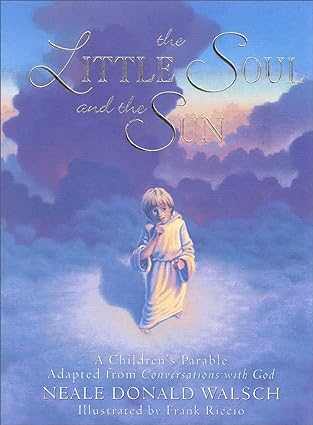
Well, it’s important. Those are highlights in anybody’s life. Whether you’re adopted or in foster care or anything, a graduation is great. You were an excellent student. You were over the moon. You had your life planned, and you had it by the tail, and you had to have a graduation. Everybody has to have a graduation.
You really cared and paid attention to it, and I felt that that was really special. Also, you welcomed my biological mother in and made her feel welcome, normal, and just part of the family, and she loved, loved, loved you. I was really, really grateful to you.
It wasn’t her personal undoing. She had no control over where she was in her life.
She didn’t have the life skills to get through life on her own, even barely, and certainly not to be able to care for a child.
So she was welcomed on holidays and at different dinners.
She looked forward to coming for Thanksgiving all year. It was all you could eat, and it was really good food. She talked about it for months before and after, too. It was really, really special. What last wisdom nugget would you want to share with our listener and viewer about any of this? It doesn’t have to be about foster care or anything. It doesn’t have to be about parenting. Just be something near and dear to your heart, something special, some sort of insight or epiphany you got.
Well, the point of it is, especially with graduation and the other things you were talking about, that everybody’s special.
Well, the point of it is, especially with graduation and the other things you were talking about, that everybody’s special. Everybody deserves to be treated special on different occasions or just on different days. Everybody needs that. A child, an adult, a foster person, an orphan, anybody just treating people special, that they’re one of a kind, that they’re important.
We are all special. We’re all equally important, but we’re all special. I remember there’s a book that I actually got you a copy of called The Little Soul and the Sun, and it talks about how it was written by Neale Donald Walsch, who wrote Conversations with God. There’s this whole kind of thread in that book, and that beautiful little children’s book about we are all special.
Being of the light and special in a particular way is something that we want to do. We want to earn that, we want to choose that, and we want to be that. We want to be the light in the way of being special in a forgiving, compassionate, or inspiring way. And so we get these opportunities, these life experiences that we signed up for before we incarnate, to be the light in that special way. We are all special.
I received so much more from each foster child.
With this, I received so much more from each foster child. They were so giving and so rewarding. I gained a lot from each experience.
Of course, each of us did, too. It’s magic, absolute magic. I don’t know if this inspires you to become a foster parent, donate, volunteer, or just tell somebody something that will help light up their day. Whatever you’re inspired to do, it’s all perfect. There are no expectations here, and there is no pressure. We love you. Make it a great week. Reveal some light in the world, and we’ll catch you in the next episode. I’m Stephan Spencer, and this is Marge Cater.
Thank you.


